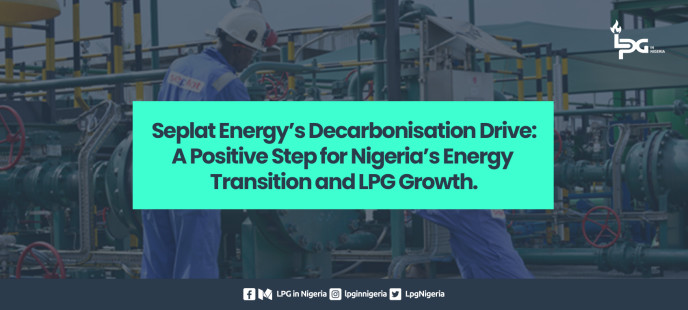- 2737
- 0
Sharing Ideas and Updates on LPG in Nigeria and related information to enable effective collaboration within the LPG Value Chain
Seplat Energy’s Decarbonisation Drive: A Positive Step For Nigeria’s Energy Transition And LPG Growth

Seplat Energy Plc, one of Nigeria’s leading indigenous energy companies, is setting the pace for sustainability in the energy sector. Through bold initiatives aimed at decarbonising its operations, the company is playing a critical role in Nigeria’s journey toward a sustainable energy future.
Seplat Energy’s climate-focused initiatives are a testament to its commitment to reducing emissions, safeguarding ecosystems, and achieving operational excellence. These measures include:
1. Ending Routine Gas Flaring: The company’s target to eliminate routine gas flaring by 2025 is a bold step ahead of Nigeria’s regulatory deadline of 2060. This initiative aligns with its net zero ambition by 2050, significantly reducing environmental harm and wasteful energy practices.
2. Investments in Gas Infrastructure: Seplat is expanding its gas processing facilities, which not only support efficient gas management but also increase the availability of cleaner energy sources like Liquefied Petroleum Gas (LPG) and Compressed Natural Gas (CNG).
3. Exploring Renewable Energy: Seplat is diversifying its energy portfolio by investing in renewable energy projects to offset emissions, reduce dependency on fossil fuels, and ensure sustainable growth.
4. Facility Solarisation: Integrating solar power into its facilities demonstrates the company’s commitment to sustainable energy solutions.
5. Tree4Life Afforestation Initiative: The afforestation programme supports biodiversity and increases carbon sequestration, helping to counterbalance emissions while promoting a healthier environment.
6. Carbon Credit and Emission Monitoring: These initiatives showcase Seplat’s proactive stance on meeting global carbon reduction targets.
7. LPG and CNG Commitments: By prioritizing LPG and CNG, Seplat is actively promoting cleaner and more accessible energy alternatives for Nigerians. Seplat has ANOH Gas Processing Plant located in Ikoyi, Lagos, Nigeria.
Sustainability at the Forefront
Speaking at the 2024 International Engineering Conference, Exhibition & Annual General Meeting hosted by the Nigerian Society of Engineers (NSE), Mr. Ayodele Olatunde, Managing Director of Seplat West Ltd, represented Seplat Energy’s CEO, Mr. Roger Brown. In a panel session on Sustainable Engineering Solutions to Food Security & Climate Change*, he highlighted Seplat’s ongoing commitment to preserving land, water, and ecosystems while minimizing disruptions to wildlife.
Olatunde stated:
“Seplat Energy is committed to protecting and safeguarding the land, water, and ecosystems around our operations whilst minimizing disruptions to wildlife populations.”
The LPG Connection: My Perspective
As someone closely engaged in Nigeria’s LPG industry, I see Seplat Energy’s efforts as a major boost for LPG adoption and growth. By ending routine gas flaring and investing in gas infrastructure, the company is ensuring that more gas is captured, processed, and made available for LPG production. This directly addresses the supply-side challenges in the LPG market, which often lead to price volatility and scarcity.
Additionally, the commitment to renewable energy and facility solarisation creates a ripple effect for cleaner energy solutions. It sets the stage for more affordable LPG options by reducing production costs and fostering innovations that can stabilize the market.
LPG remains one of the cleanest and most efficient fuels available, and as Seplat aligns its operations with global sustainability goals, it indirectly strengthens the foundation of the LPG value chain in Nigeria. More gas processing facilities mean greater access to LPG for households and businesses, bridging the gap between demand and supply while supporting Nigeria’s energy transition.
A Bright Future for LPG and Clean Energy
Seplat Energy’s sustainability journey is a win-win for Nigeria’s energy sector. By focusing on decarbonisation, the company is not only mitigating climate risks but also creating new opportunities for cleaner energy solutions like LPG and CNG. This is particularly critical as Nigeria seeks to increase LPG adoption across homes and industries, reducing reliance on dirtier fuels such as charcoal and kerosene.
The company’s efforts underscore the importance of collaboration between energy stakeholders to drive innovation, investment, and environmental stewardship. By setting a benchmark for operational excellence, Seplat is demonstrating that sustainable development is both achievable and necessary for a thriving energy sector.
Final Thoughts
Seplat Energy’s decarbonisation initiatives are a step in the right direction for Nigeria’s energy landscape. As an advocate for LPG growth, I believe these efforts will create a more stable and accessible market for cleaner energy alternatives, ensuring a sustainable and prosperous future for all Nigerians.
For more insights on how Seplat’s initiatives impact the LPG industry and Nigeria’s energy transition, stay tuned!
















0 Comment.